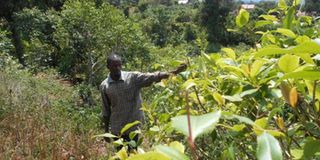Khat farmers oppose proposed narcotics law

A khat farmer inspects his farm in Kibibi Town, Butambala District, recently. photo/FILE
What you need to know:
Many farmers say it is their source of livelihood and that banning it has serious consequences.
More than 10,000 khat (mairungi or miraa) cultivators and sellers in Kabarole District are rallying against the passing of the Narcotic Drugs and Psychotropic Substances Control Bill, 2023, which seeks to criminalise khat farming.
Their concern is rooted in the potentially dire consequences the Bill could have on their livelihoods. The farmers say for more than four decades, they have relied on khat cultivation for income. They are from sub-counties of Hakibaale, Kijura, Harugongo and Kibatsi.
Mr Fred Gaaki Rwitanga, the Hakibaale Sub-county chairman, emphasised that khat sales directly contribute to funding local initiatives.
He said although he personally doesn’t consume khat, its cultivation forms his primary source of income, adding that he earns about Shs4 million every three months.
“As local leaders, we strongly oppose any efforts to halt khat cultivation. Such actions disregard the fact that this activity provides essential income for us to support our families. Khat cultivation has played a pivotal role in shaping our lives, enabling us to provide for our families, including ensuring our children’s education,” he emphasised.
Col (rtd) Steven Basaliza, highlighted the financial profitability of khat cultivation and expressed concerns about the potential losses they might incur if it is banned.
He urged fellow cultivators and sellers to actively participate in the political process.
“Our expectation is for our MPs to actively engage in lobbying other parliamentarians to prevent this proposal from gaining momentum in the legislative process. Should any MP from Tooro Sub-region support the removal of khat, we shall mobilise and vote them out in the next election,” he said.
Mr Steven Mugume, a resident of Rwekuba Village, said under the Parish Development Model, numerous associations of khat farmers and sellers have been formed and registered, providing a dependable source of funding for the community.
He argued that abolishing khat production would negatively impact farmers’ finances and eliminate a crucial avenue for income generation.
“In my village, numerous associations dedicated to khat farming have been established. These groups stand out as the most vibrant compared to others. They provide a reliable source of daily income and enable members to repay loans. Contrarily, government initiatives such as distributing heifers, have not yielded the desired outcomes. For us farmers, these Khat associations represent our primary ray of hope,” he said.
Mr James Tusiime, a khat farmer, said he owns a three-acre tea plantation but he struggles to generate Shs300,000 a week from it. On the other hand, he said he earns more than Shs8 million from half an acre of khat.
“Khat proves to be the most profitable crop in our area. It has had a positive impact on people’s livelihood by improving their standards of living,” he said.
Mr Tusiime also expressed concern that any government move to abolish khat production could lead to dire consequences, including an increase in criminal activities in affected communities.
Several farmers expressed concern that their children might turn to crime if their livelihoods were jeopardised by the cessation of khat cultivation.
Mr Steven Kagwera, the Burahya County legislator, backed the farmers. He said although Parliament might pass the Bill, the President might be hesitant to sign it. He emphasised the importance of following the proper procedure and removing politics from the issue.
The Kabarole District Speaker, Mr Timothy Ruhweza, said the district council will never pass any by-law that prohibits the cultivation of khat in the district.




